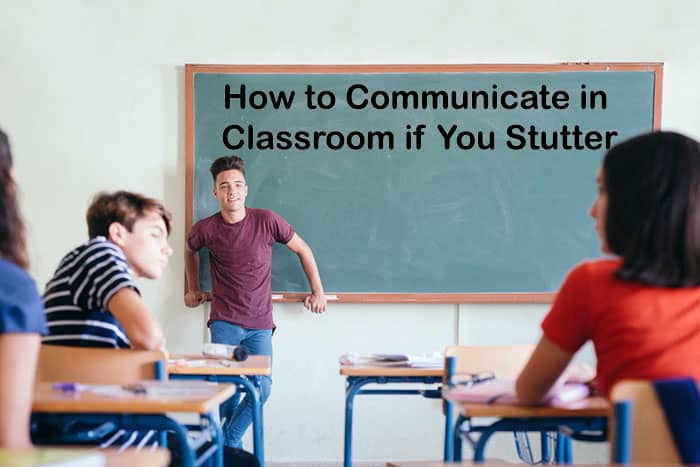
Public speaking frequently ranks highly on lists of people’s most prevalent fears. Stuttering presents a special set of challenges, so it makes sense that people who stutter frequently experience even higher levels of fear in relation to public speaking. There are many ways to prepare yourself for success if you stutter and have a public speaking assignment at school.
Tips for Students Who Stutter in Public Speaking: Consult Your Teacher
It’s very beneficial to discuss stuttering with your teacher or professor, as we covered in a previous article about public speaking accommodations for students who stutter. They probably don’t know much about stuttering, like the majority of people, and they certainly don’t know what kind of accommodations you might require.
In addition, if your teacher notices that your speech differs from other students, it’s just comforting to know that they are aware of the situation. 3 Basic Rules of Self-Advertising Your Stuttering, a previous blog post, has more information on this subject.
Discuss with other students
When those close to you are aware that you stutter, it can be much easier to muster the courage to speak. Some people find it beneficial to discuss stuttering with just one other student in the class, perhaps a friend or the person you interact with the most frequently.
Sometimes it’s beneficial to discuss it with multiple students, especially if you’re giving a group presentation. It’s a brave move, but some people go one step further and admit to the class that they stammer right at the beginning of the speech.
The key is to be assertive and direct whether speaking to one person or a group of people. “By the way, you might have noticed that I stutter, so if you hear me getting stuck on a word, that’s just a stuttering block.
Suggested Read- How to Become Great at Public Speaking: Tips to Help You Crush Your Next Presentation
Prepare!
You might have a history of over or under-preparing for speeches due to your particular experience with stuttering. Some stuttering students spend too much time writing, and a large portion of this extra effort is directed toward extra rehearsing or selecting the appropriate words to increase speech fluency.
Others may under-prepare because they feel that improvising will improve their fluency or because they are overwhelmed by the anxiety that preparation causes. However, you might discover that your efforts to stop stuttering actually make it harder for you to speak in front of an audience.
How would you practice for a speech if you didn’t stutter, for instance? What would you say?
Take on the assignment, study the material, complete the prewriting, decide whether to write the speech verbatim or create talking points in the form of bullets, and choose between memorizing it and reading it.
When preparing for a public speech, there are numerous factors to take into account, and worrying about stuttering can easily distract from crucial planning. Now, it’s easier said than done to stop worrying about stuttering!
However, make an effort to recognize when your thoughts are being consumed by worry and return to the plethora of other factors that were previously mentioned. No matter if you stutter during the speech, being well-prepared can really boost your confidence.

Rehearse!
In addition to the writing portion of preparation, practicing beforehand can help you iron out any timing, wording, and delivery kinks. Additionally, practicing helps you get ready for any potential thoughts and feelings. Speaking in front of a live audience, like a classmate, friend, or family member, has definite advantages.
Additionally, the more you can do to mimic the speaker’s actual setting, the better. For instance, many college students find that practicing in an empty class or a study room at the library is beneficial.
No matter where you are, get up and picture the class in front of you. Set up a few focal points for you to look at in the room so you can practice making eye contact.
Suggested Read- Why Do Most of the People Have Fear of Public Speaking?
Typical Public Speaking Advice: Stuttering Experience
There are many suggestions in books and online, but let’s look at some of them from the perspective of someone who stutters:
Eye contact
The majority of public speaking professionals concur that it’s crucial to maintain eye contact with your audience for a number of reasons. You can read your listeners’ nonverbal cues, project confidence, feel more at ease with your audience, and more with its assistance. For those who stutter, maintaining eye contact can be difficult, especially when they are stuttering.
If you currently find it difficult to maintain eye contact when speaking in a classroom setting, it might be too much to ask of yourself to do so when giving a speech in front of an audience. Choose a few audience members (left, right, and center) that you can look at for a few seconds at a time if you’re ready to start working on it.
Eye contact is one of those speaking difficulties that gets easier the more you do it. The problem of stutering in classroom while communicated can be improved better with rigorous practice and public speaking courses.
Body language
The influence of “body language” on non-verbal communication is significant. Your teacher may advise speakers to stand straight and open, with their feet shoulder-width apart and their hands out of their pockets, among other suggestions.
Good body language becomes easier with practice, just like many other aspects of public speaking. If you’re unsure of yours, ask a reliable friend or coworker to see a practice run of your speech and provide feedback.
The way you stutter can have an impact on some aspects of your body language. For instance, you might worry about unintended movements like eye blinking, hand, foot, or head movements. Think about discussing this aspect of your stutter with your professor.
Purpose
There is a wealth of knowledge available regarding the three primary goals of public speeches, which are 1) to persuade, 2) to inform, or 3) to entertain. Additionally, it’s critical to clarify for your audience the who, what, where, when, and why questions you intend to address in your speech.
Let’s examine the motivation for stutterers in more detail. You might find yourself focusing more on your speech fluency during the speech’s preparation, practice, and actual delivery. This focus on fluency consumes mental energy and may divert your attention from the speech’s actual subject and goal.
Speech Rate
The use of pauses can help you pace your speech, keep track of what you want to say next and improve listener comprehension. Additionally, it can help you convey to the audience how much you value their thoughts on what you just said. This is frequently a crucial skill that is assessed in speeches given in class.
What about pauses brought on by stuttering blocks, though? What about faster speech rates brought on by cluttering or stuttering?
Fear and Nervousness
The majority of people experience some level of anxiety and fear when speaking in front of an audience. Keep in mind that trying to ignore or suppress these emotions may actually make them worse. Try to tolerate the anxiety instead.
